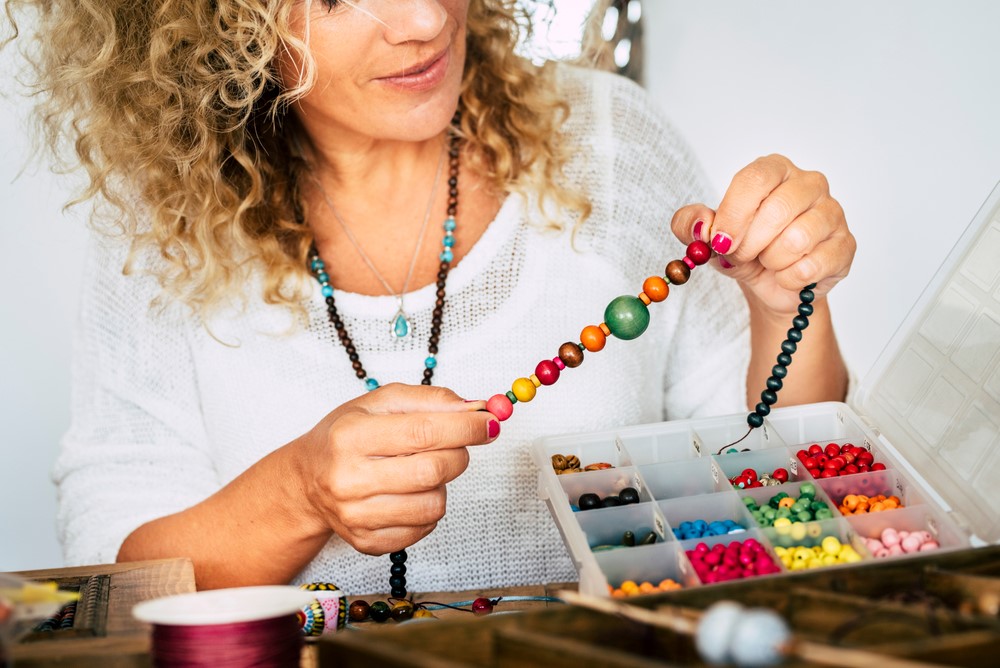
Having your own interests and passions is always important – and is even more crucial for caregivers.
And, let’s be clear, hobbies for caregivers are much more than just a way to pass the time. They’re an essential part of maintaining your own identity and broadening your world.
Why does this matter? Because it’s incredibly easy to get lost in the role of a caregiver. You can get to the point where being a caregiver might feel like all you are. Where your attention is on the role all day every day.
Getting lost like that is the road to burnout. It can also lead to stronger emotional swings and more challenges overall. To be effective as a caregiver, you need things of your own, things that make you happy.
Right now, doing this might seem impossible. But, don’t sell yourself short. You’re more powerful than you feel and solutions don’t need to be difficult. Sometimes you just need to make to make one tiny change at a time.
And, in this post, we’re looking specifically at realistic hobbies. Ones that are actually feasible in your life as a caregiver. These tend to be hobbies that are easy to pick up and put down, and don’t require too much financial investment.
Of course, there’s an endless list of possible hobbies, so if we’ve missed one of your favorites, please let us know in the comments section.
How to Choose the Best Hobbies
Before we dive into the list of hobbies for caregivers, there’s something else to talk about – how you decide the best hobbies for you. This includes which hobbies are best in which situations.
This is crucial, as hobbies can be quite different than one another. They also meet different needs. This is why we’ve broken our hobbies into a few different sections.
- Relaxing hobbies typically ask much less of you. Some, like gardening or yoga, involve simple physical movements, while others might involve barely any movement at all. Such hobbies give your body and mind a chance to rest and regroup.
- Distracting hobbies. While these hobbies don’t necessarily require a lot of energy, they can still give you a break. Your challenges don’t go away, of course, but having time away from them often helps you to see things more clearly and resets your emotional energy. And, honestly, we all need to switch off from time to time.
- Engaging hobbies. These tend to take up a decent amount of mental and/or physical energy, but often provide a lot in return. They’re powerful for pulling you out of the current situation and giving you somewhere else to put your attention. In doing so, they’re a good reminder there is more to your life than caregiving.
- Purposeful hobbies. These hobbies are more than just a way to spend time. They also have some greater purpose, like crafting to earn money or as gifts for other people. This can be a powerful idea, as it stops your days from being too repetitive and helps to meet some often overlooked human needs.
These four categories are a useful guide when you’re looking at hobbies for caregivers.
You’re likely to need some hobbies in each category, as sometimes you’ll just need to rest, while other times you’ll need to be engaged instead.
Top Hobbies for Caregivers

Relaxing Hobbies
1. Knitting or Crochet
Knitting and crochet have an old-fashioned feel about them, but they’re not just hobbies for seniors. They’re something that anyone can do. In fact, many younger people are getting involved in knitting, to the extent that it has become ‘cool’ again.
This popularity isn’t so surprising either.
Knitting and crocheting are both relaxing hobbies, ones that allow you to slow down and catch your breath. You end up with a portable project too, one that you can easily take from room to room.
You might even take your knitting or crochet with you when you go out. What could be better when you’re waiting for your family member to see the doctor?
You don’t need to stick with simple projects either. There are plenty of more involved ones that will get your creative juices going.If you’re not sure where to start, why not pick up a knitting subscription? Knit-Wise has a Knit Monthly box that provides you with all the tools, yarn, and instructions that you need for your first project.
2. Gardening
There’s something therapeutic about having your hands in the soil. Gardening is well-known as a way to decrease stress, improve your mental health, and even help with your physical health.
It’s another activity that can be as simple or as complex as you want it to be.
If you don’t have much time, why not try working with a few pot plants or even air plants around the home?
Gardening subscription boxes are a fun place to start, as they often ship you out a plant or two every month, Our favorite is My Garden Box. While the name of the box is hardly creative, the selection of plants can’t be beaten.
3. Baking
Baking is the go-to relaxing activity for many people. It seems to have the perfect combination of features, as you have to put some thought and effort in (but not too much), you’re working with your hands, you’re creating something, and there are many delicious smells.
Plus, if you’re baking sweet treats, you also get a reward at the end.
If you’re worried about eating too many treats, you could always give your baking away as gifts instead. Friends and family are certain to be grateful.
Baking can easily turn into a family activity too, especially if you play around with baking subscription boxes, like this one.
The same principles apply to other hobbies in the kitchen as well, like cooking, fermenting, or even making your own spice mix. Just look for your happy place.
4. Photography

You don’t need an amazing camera to turn photography as a hobby. For that matter, even your cellphone camera will do the job perfectly.
As strange as it might sound, I love walking in nature with my phone, taking photos as I go. Somehow doing so enhances my experience and there’s always something relaxing about being outdoors.
I love my phone camera for social occasions too, as I get the chance to take candid photos. Phones are so common that people barely notice them these days, so I can get some amazing shots.
Plus, using your phone for photography gives you a hobby that you can take almost anywhere. Even a doctor’s office or grocery store can yield some interesting photos.
The approach can change the way you see situations too. You’re on the eye out for interesting and exciting moments, so you start to notice these more and the difficult ones less.
5. Yoga
Yoga is naturally relaxing. More than that, it gives you the chance to connect with your body and mind, to come into focus.
The same is true for related hobbies, like tai chi and meditation.
You should be able to find group classes for these hobbies in your local area. Doing so gives you the chance for social connection at the same time.
6. Reading
We can’t forget about reading, can we? It’s still one of the most popular hobbies.
It can be a pretty inexpensive hobby too – if you get your books from the library or buy eBooks rather than physical books. Don’t forget about yard sales and thrift stores either.
There’s an endless debate about whether physical books or eBooks are better.
It’s true, little is better than the smell and feel of a physical book. It’s also nice to get away from a screen for a while. Still, you can fit hundreds of eBooks on your phone, which is great if you like different genres of books for different situations.
And, if reading books isn’t the right fit, try audiobooks instead. Audible is a particularly good service (you can try Audible Plus here).
7. Puzzles
There’s no shortage of relaxing hobbies and we’re not going to cover all of them. The last one to mention, however, is jigsaw puzzles.
Puzzles are incredibly relaxing, as there’s nothing much to think about. You’re simply matching images.
This is also another hobby that is easily shared, so you could work on a puzzle on your own, with the senior, or even with the whole family.
Distracting Hobbies

1. Video Games
I know, I know. There’s a strong stigma around video games. Honestly though, they can be amazing.
What else can take you out of your world so completely for a little while? Sure, you can watch a movie, but with a video game, you’re actually participating rather than just watching.
As hobbies for caregivers go, video games can work well. There are many different options to choose from, they take you out of your situation for a while, and they can be inexpensive.
The price factor, of course, depends on the specific game that you choose. If you’re using the latest generation console (like a PS5) and brand new games, then you can expect to pay a pretty penny. But, you can have just as much fun for a fraction of the price by going a generation or two back.
Or, if you’re a PC gamer instead, you can purchase games through services like Steam, Humble Bundle, and Epic Games. Those services all regularly offer deep discounts and Epic Games even has free offerings regularly.
Video games are one of those hobbies that fits into multiple categories. You can certainly find relaxing video games as well as engaging ones. This is particularly true for mobile phone and tablet games.
2. Watching TV Shows
I know. Calling TV shows a hobby might sound like a stretch, but honestly, they can be.
Like games, TV shows can pull you out of your situation. Movies work too, but TV shows are sometimes more powerful, as you get to connect with a group of characters over a drawn-out period.
Something similar can happen when you read as well, where you start to emotionally connect with characters – even though they’re entirely fictional. This connection is one reason why TV shows and movies can often tug at your emotions.
As a caregiver, it’s important to choose what you watch wisely. Pay attention to how different shows make you feel and what they do to your energy levels.
For example, sci-fi and fantasy shows work well for me, as they are so far removed what is going on right now in my life. In contrast, dramas that focus on everyday interactions and relationships can be difficult, as I draw too many parallels between myself and the characters.
3. Sports and Exercise Classes
If you want to use your whole body rather than just your mind, then sports and exercise classes are both ways to do this.
There are plenty of obvious options here, so we won’t describe them any more.
What if you’re stuck at home as a caregiver?
Online exercises classes are an obvious alternative. I particularly like options like Zumba and Tae Bo, because you need to concentrate on what you’re doing. The music and dancing aspect of Zumba is helpful too and will often boost your mood.
Engaging Hobbies

1. Reading
Reading can be relaxing, engaging, or both, depending on who you are and what you’re reading.
Often though, reading can be an amazing way to get away from your current situation and immerse yourself in a completely different world. Doing so can give you a much needed escape.
2. Writing
Writing, in all forms, is a fantastic hobby.
You need barely any tools, just pen and paper (or perhaps a laptop if you prefer the digital approach). You can also be as creative as you like.
Perhaps you want to try your hand at poetry or writing short stories. Even a novel.
Don’t worry if writing fiction feels like too much. You’re not obliged to publish anything. Perhaps you will and perhaps you won’t (if you do work towards publishing something, then writing starts to fall into the purposeful category as well).
Oh – and if you want an easy place to begin, try fan fiction. This simply involves taking characters and worlds that already exist, then playing with them in your own writing.
Creative writing isn’t your only option. Some people choose to journal instead or take a non-fiction approach. Writing on blogs, either your own blog or as a guest writer, can be a good approach too, giving you the chance to share your stories and experiences with others.
3. Singing, Dancing, and Making Music
I love music-based hobbies, perhaps more than any other type.
There’s something incredibly uplifting about music that makes it easier to shift into a better state. Plus, you can choose the type of music and the activity based on what you need.
For example, you might choose slow songs when you want to calm down and relax, or upbeat music when you want to be energized.
There’s an almost endless range of music-based hobbies to try, including the following.
- Singing. This could be as simple as singing along to your favorite tune at home or something more involved, like taking singing lessons or joining a choir.
- Learn or practice a musical instrument. Music takes time and patience, but sometimes this is a good thing. If you can’t make much noise around the house, why not try an electronic keyboard and headphones?
- Join a local dance group. There are often various ones to choose from, including ones that mostly meet online and only have in-person gatherings every so often.
- Create and rehearse dance numbers (even if you never perform). This is an area that I’ve started playing around with recently and it’s a lot of fun. I love the amount of practice and attention that it takes to create good routines. The process is much more engaging than simply dancing at random.
Don’t forget that you can involve the senior as well. Karaoke to old tunes is a fun hobby that the whole family can enjoy.
4. Arts and Crafts
There are countless hobbies in the arts and crafts category. Honestly, we could make a list of just these and nothing else.
The general theme is always the same – you’re making something creative with your hands. Sometimes you might be following a set of instructions, while other times you’re going it entirely on your own.
Arts and crafts are fantastic for caregivers, as they’re enjoyable and give you the chance to make something.
There is one catch though, many such hobbies quickly get expensive. For example, if you’re making jewelry, you’ll need to buy materials regularly.
There are two ways around this.
One is to choose arts and crafts hobbies that don’t require many resources, like the following:
- Sketching – you just need some pencils and paper.
- Crochet and knitting – while yarn can get expensive, it’s the only material that you need to stock up on regularly and you can find bulk lots on eBay and in markets for a relatively low price.
- Sewing – your main materials are needles, thread, and whatever base material you’re working with.
- Origami – you might need to choose your paper carefully, but aside from this, there are no materials to worry about.
- Fairy gardens– this hobby has been taking off recently and involves making scaled down gardens. You can buy full fairy garden kits or small ornaments, or rely entirely on natural resources, like moss, twigs, and bark.
- Macrame – the main expense here is just the cords you’re working with.
- Flower pressing – most of your materials are just flowers here. You don’t even need to buy a proper flower press, as some heavy books will do the trick.
The other approach is to look for ways to cut down the cost.
For example, if you’re interested in scrapbooking or collage art, you could use an art project book as the base for your work, then get most of your images from old magazines (which are often incredibly cheap at a thrift shops).
For sewing-related hobbies, you might ask friends to give you old clothes that they would normally donate or throw out.
5. Puzzles (like sudoku)
While jigsaw puzzles are generally relaxing, other types of puzzles tend to engage your brain instead. Sudoku is a classic example, as you need to think about what numbers go where.
There are also plenty of other options, including word puzzles, brain teasers, logic problems, and more.
You can find physical books with plenty of puzzles in them (like this one) or look for an app instead. Mixed activity books are a great option as well.
Purposeful Hobbies

1. Arts or Crafts for Income
Arts and crafts hobbies tend to be relaxing and/or engaging, depending on what you choose and how much energy you put in. They can easily be purposeful as well, if you’re doing something with the finished craft.
Making money with your crafts kills two birds with one stone. Not only are you giving yourself a sense of direction and purpose – but you’re also making money.
Don’t worry. You don’t need to create a full business on the site to make this idea work (although some people do). Even just selling soaps to friends via Facebook or at a market every so often can be powerful emotionally.
2. Making Gifts
One of my favorite hobbies as a caregiver was making little gift boxes for other people. I never had much money, so they were always a combination of homemade items, small treats from the store (like a special chocolate bar), and thrift store finds.
The goal was to make people feel better, as life can be overwhelming at times. Seeing the spark of happiness on a person’s face was incredibly important for me.
Whenever possible, I tried to tailor the gift to the person that it was made for. Doing so made it more special for them, but also meant that I needed to put more time and thought into the process, which was just as important.
Because my time was always limited, it took a long time to get gifts completed. That wasn’t a problem though. Honestly, it was amazing to have a project in the back of my mind whenever I went out, one that had nothing to do with caregiving at all.
3. Learning a Skill or Completing a Class
Sometimes meaning comes from progress, from the sense that you’ve got somewhere, that you’ve been successful.
You can do this by working on something that has a clear sense of progression, such as learning how to play guitar or working through a course from an online college.
Anything relevant to your future after caregiving could be particularly relevant, like keeping up with the skills in your field.
4. Blogging
Blogging is popular and incredibly accessible. These days, you don’t need any special skills to start a blog (beyond basic computing and writing skills).
Your blog could be anything. It could be about caregiving, about your personal journey, or perhaps about something completely different. It might even be a chance to talk about your current passion.
Dealing With Guilt From Hobbies
There’s one more important area to talk about, the guilt that sometimes comes with doing things for yourself, This is an incredibly common issue for caregivers and anyone with a giving nature.
This guilt can stem from many areas, including social conditioning, values instilled in us as children, over-identifying as a caregiver, or limited self-love.
There are multiple ways to deal with caregiver guilt, including looking at your self-talk, re-evaluating the situation, and perhaps even considering therapy. And, sometimes, the answer is to simply do what you need to regardless.
That means still practicing your hobbies, even if you feel bad about doing so at times. After all, your thoughts and emotions aren’t always true. They’re better seen as signals instead. Sometimes they’re accurate. Sometimes they’re dead wrong.
Final Thoughts
All these hobbies (and many more!) can be a fantastic fit for caregivers.
However, some are going to work better for you than others. The trick is to find the hobbies that meet your needs best at the time. This might mean having multiple hobbies on the go, including some that help you to relax and others that give you a sense of direction instead.
So… pay attention to yourself. See what works and what doesn’t.
As you do so, try not to take on the social norms around hobbies. For example, playing video games or watching TV might seem ‘worse’ than crafting or gardening.
Yet, sometimes you may need the distraction that comes with a bright and noisy TV show. While overdoing it on video games or TV isn’t healthy, using them as occasional distractions isn’t a bad idea at all.
Likewise, you might find that yoga and meditation make you worse. They do for some people. You might need to go for a walk on the beach or find an entirely different hobby.
Feeling Overwhelmed?
Check out our Caregiving Consulting service for personalized support and guidance.


Leave a Reply